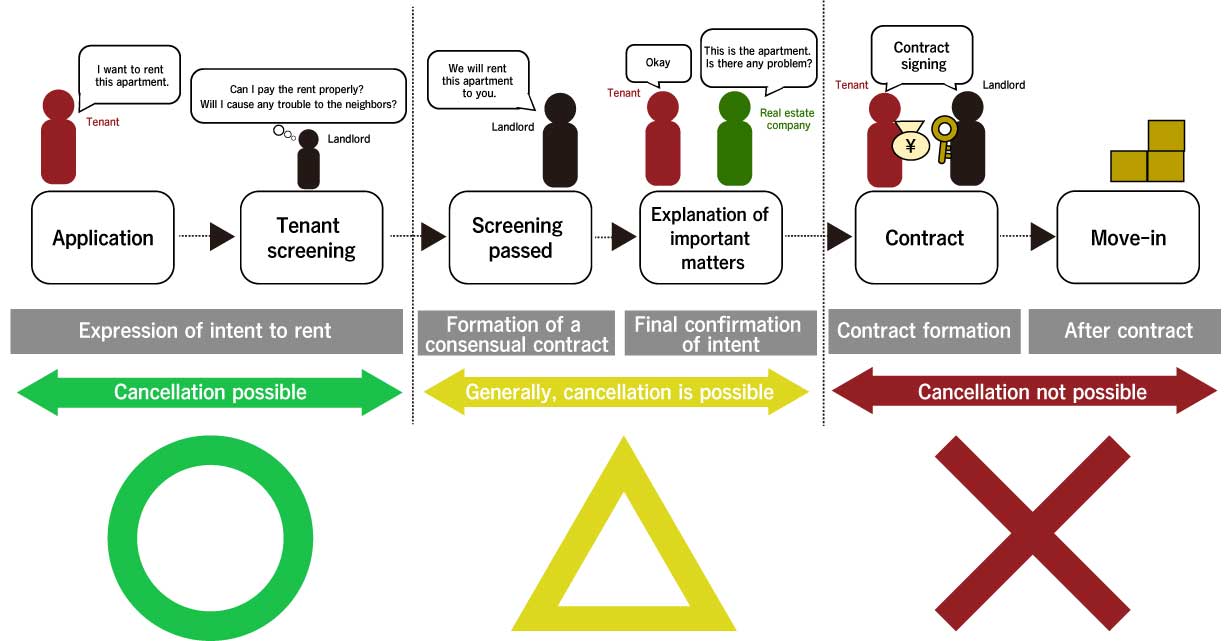
During the busy rental season, many people might consider submitting an application to temporarily hold a property. However, can you cancel a rental application after submitting it? While it may seem like there’s no problem canceling before the contract is signed, there are significant risks involved. There may be cases where a cancellation fee (damages) is incurred, or the cancellation might not be possible at all. This article explains the process from application to contract and clarifies when you can cancel.
Let’s quickly address whether you can cancel after applying for a rental.
In most cases, you can cancel until you sign the contract. A rental contract requires an "Explanation of Important Matters" by a qualified real estate agent. While a lease agreement can be verbally binding (consensual contract), real estate agents are required to explain important details to the tenant before finalizing the contract. Therefore, not all requirements for contract formation are met at this stage.
In principle, there is no cancellation fee if you cancel the application. Some real estate companies may require a "holding deposit" or application fee, which can range from several tens of thousands of yen to one month's rent. This deposit should be treated as a holding fee and should be refunded. If a real estate company refuses to refund this deposit, it is a violation of the Real Estate Business Act (Article 47-2, Paragraph 3), and you should contact the real estate consultation office at your prefectural government to request a refund. The reason for the "in principle" note is explained in section (3) Flow from Application to Contract [Approval of Screening].
The process from application to contract progresses as shown below.

Application:
After viewing a property and deciding to apply, fill out the required forms and submit necessary documents for screening. You can still cancel at this stage. Detailed instructions for filling out the application are available in related articles.
Screening:
The landlord or management company conducts a screening based on your application. The screening checks if you can afford the rent, can provide a guarantor or use a guarantor company, and will not cause trouble after moving in. You can cancel before the screening result is out. More details on the screening process are in related articles.
Approval of Screening:
If you pass the screening, the landlord agrees to rent the property to you. At this point, both parties have verbally agreed (consensual contract). However, since tenants typically lack the real estate knowledge of landlords or agents, tenants are given an "Explanation of Important Matters" to make a final decision before signing the contract. Therefore, you can generally still cancel at this stage.
The term "generally" is used because, for example, if you negotiated with the landlord to install an additional air conditioner in exchange for signing the contract, and they did so, canceling afterward could result in the landlord seeking compensation for their losses. Similarly, if you asked the landlord to hold the property for two months while you returned from overseas, and then canceled at the last minute, they could seek damages for lost rent during that period. The Civil Code mandates that both parties act in good faith during contract negotiations, and failing to do so allows the landlord to claim damages. There is a precedent from the Tokyo High Court on January 31, 2008, where the tenant was found liable for such damages.
Therefore, remember that if you negotiate any terms when applying, you should not cancel without expecting potential repercussions.
Explanation of Important Matters:
Before signing the contract, a real estate agent provides an "Explanation of Important Matters" to help you make an informed decision. If new information arises during this explanation that changes your decision, you can still cancel. However, rejecting previously known terms at this stage is considered bad faith. Remember, the consensual contract is established at screening approval, so you cannot cancel for any reason at this stage without consequences. Details on this explanation are available in related articles.
Contract Formation:
After the "Explanation of Important Matters," you sign and seal the contract. At this point, your obligations to pay the contract fee and rent fee, and to occupy the property, are confirmed. You cannot cancel after the contract is formed, regardless of whether you have received the keys or paid the contract fee.
Can you cancel after signing a lease agreement? As mentioned earlier, cancellations after signing the lease agreement are not allowed.
After signing the lease, any cancellation is considered a "termination." Rental agreements are typically for two years, so an early termination would apply. This applies even if you have not yet received the keys.
What costs might arise if you terminate the lease after signing? Here is a summary:
| Item | Typical Cost | Refundable upon Termination |
|---|---|---|
| Deposit | 1-2 months' rent | Fully refundable before moving in |
| Key Money | 1-2 months' rent | Not refundable |
| Prepaid Rent | 1-1.5 months' rent | Refundable depending on notice period |
| Guarantor Company Fee | 50% of monthly rent | Not refundable |
| Agency Fee | 1 month’s rent + tax | Not refundable |
| Fire Insurance Fee | 20,000-30,000 yen | Partially refundable per policy |
| Key Exchange Fee | 25,000-30,000 yen | Not refundable |
| Short-Term Termination Fee | 1-2 months' rent | Applicable if stipulated in the contract |
As shown, refunds for contract payments are rarely given when terminating the lease.
Is the Security Deposit Refundable?
The security deposit is intended to cover any restoration costs and unpaid rent. Therefore, if you terminate the lease before moving in, it is generally fully refundable. However, if you have moved in even once, expect to be charged for restoration costs.
Is the Key Money Refundable?
Key money is a non-refundable gratuity paid to the landlord upon signing the contract.
Is Prepaid Rent Refundable?
Most rental agreements include a clause specifying the notice period required for early termination. Rent beyond the notice period from the rent start date is generally refundable.
Is the Guarantor Company Fee Refundable?
The guarantor company fee is usually non-refundable. Check the guarantor company's terms for details.
Is the Agency Fee Refundable?
The agency fee is a commission paid to the real estate agency upon contract signing, and it is non-refundable.
Is the Fire Insurance Fee Refundable?
Fire insurance is typically aligned with the lease period, and some portion may be refundable based on the insurance company's policy upon termination.
Is the Key Exchange Fee Refundable?
If the key exchange has already occurred, do not expect a refund.
Handling of Short-Term Termination Penalty
If the lease includes a clause for short-term termination penalties, you will be liable for these additional fees.
Given these conditions, terminating a lease after signing typically does not result in significant refunds, so proceed with caution.
It should be clear by now that cancellations should not be taken lightly. Here are important considerations if you must cancel for unavoidable reasons.
If you need to cancel, inform the relevant parties as soon as possible. The usual timeframe from application to approval is 2-4 business days, but some landlords may provide immediate approval. As noted earlier, an agreement is considered established once the application is approved, so early notification is crucial.
If there is even a slight chance of cancellation, avoid negotiating. Especially for changes to equipment or interiors, which may incur actual costs for the landlord and lead to liability for damages. Even negotiating to postpone the contract date can result in opportunity costs for the landlord.
Avoid making multiple cancellations at different real estate agencies, as the same management or guarantor company may be involved. If you apply to multiple properties simultaneously, you are unlikely to pass the screening. Remember, real estate agencies earn their commission only upon contract completion, and cancellations mean no compensation for their time and effort.
If you have a compelling reason for canceling, clearly communicate it to the landlord and real estate agency. Honest and transparent communication can help in obtaining their understanding.
Finally, let's discuss the risks associated with canceling a lease.
Some property management companies may deny applications if you have a history of cancellations. This means you may never be able to rent from that management company again. Guarantor companies also keep records of cancellations, which can adversely affect your future applications. With 80-90% of rental properties now requiring guarantor companies, and with these companies sharing data, frequent cancellations can make it significantly harder to rent in the future.
As discussed multiple times, once the application is approved, an agreement is considered in place, and any actual losses incurred by the landlord can result in liability for damages. Although future losses are typically not included, any specific costs incurred by the landlord in preparation for your move-in can lead to compensation claims.
Real estate agents put in significant time and effort to support you, and sudden cancellations can be frustrating for them. Since they earn their commission only upon successful contracts, a cancellation can mean working for free. While most will understand if your reasons are genuine, some agents might react negatively, so be mindful.
This concludes our discussion on whether you can cancel a rental application and the associated fees. Knowing the timings and implications of cancellations is crucial. Being mindful of the considerations when canceling is equally important. Particularly during busy seasons, we understand it can be challenging to secure popular properties. We hope you find your ideal property and proceed smoothly to the contract stage by closely working with your real estate agent. If you're looking for properties along the Tokyu line, feel free to consult with Balleggs. Our experienced staff are ready to assist you thoroughly! Thank you for reading until the end.

